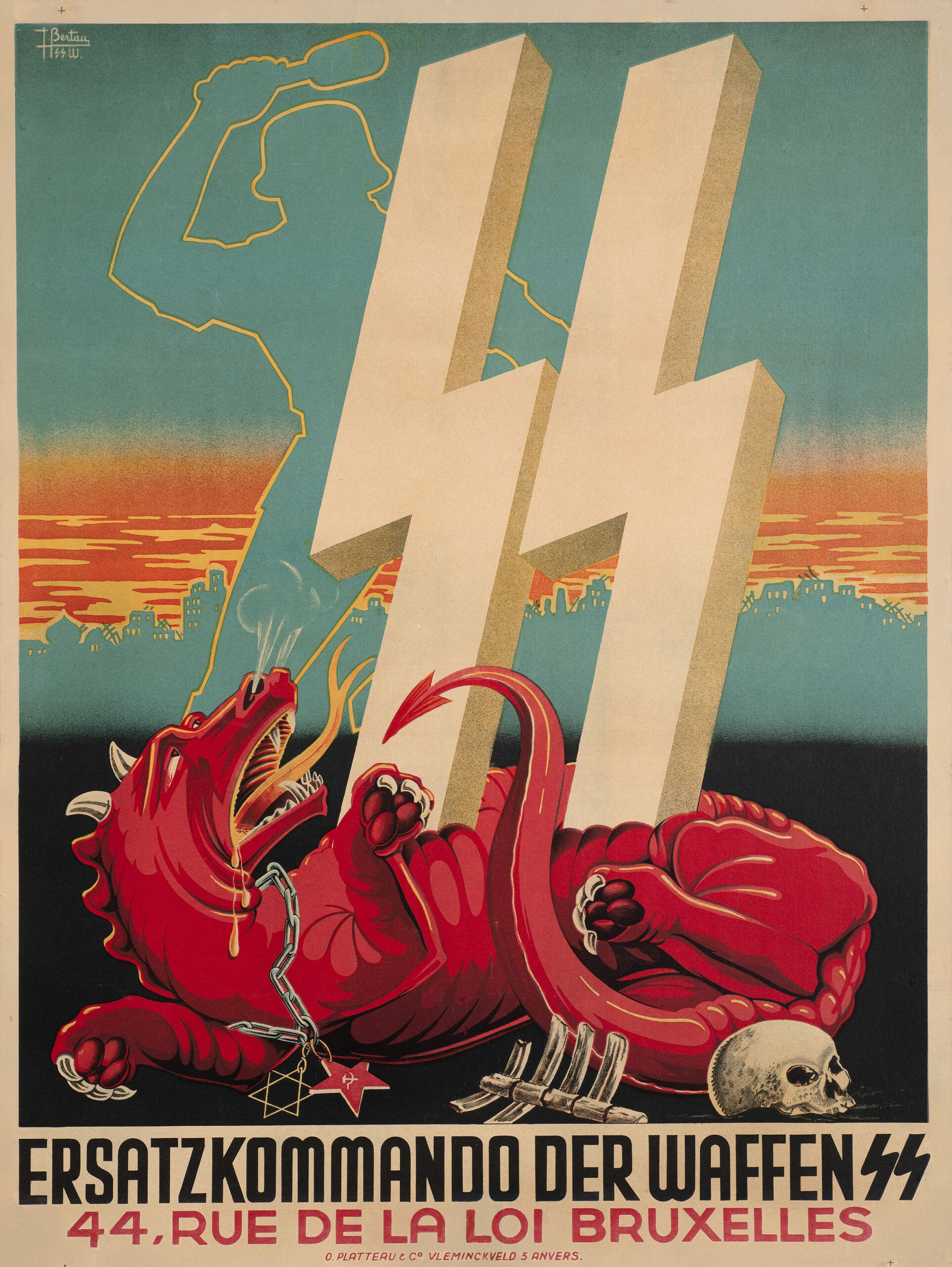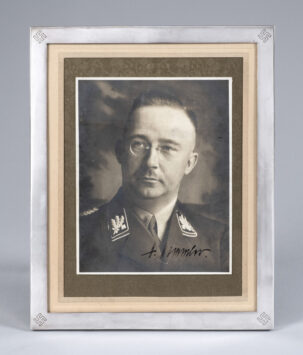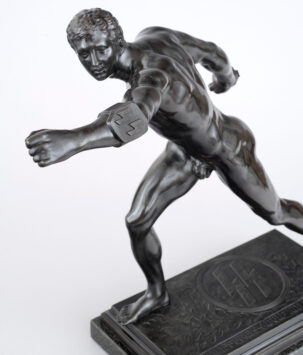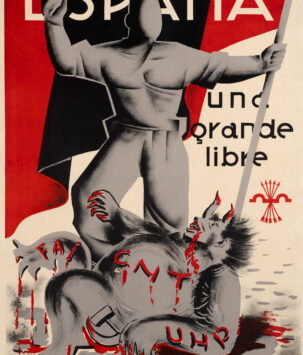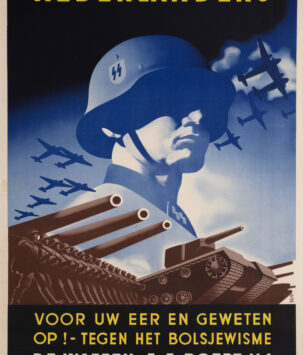Ersatzkommando der Waffen-SS
Belgian recruitment poster for the Waffen-SS Ersatzkommando (Armed-SS replacement troops).
The runic insignia of the Schutzstaffel (SS) are represented as two mighty lightning bolts impaling the red dragon of communism and pinning the beast to the ground with righteous fury. Donned by the dragon is a chain bearing the Star of David, indicating Zionist control over communism. The skewered beast is thus an unmistakable allegory for Judeo-Bolshevism, with the skeletal remains surrounding it portraying the victims of its genocidal machinations. Behind the runes is a silhouette of a German landser (soldier) wielding a stick grenade as if to bludgeon the Judeo-Bolshevik menace. The implication behind the soldier’s empty outline is for it to be filled by the poster’s audience as a potential recruit of the elite anti-bolshevik legion of the Waffen-SS. The urban backdrop depicts either the ruins of Europe wrought upon it by the Bolsheviks or possibly the Bolshevik lair, Soviet Russia, where the Germans seek to drive the foe back to. The latter is theorized through the presence of what appears to be an onion dome of a Russian Orthodox church towards the left of the landscape.
Illustrated by F. Bertau in 1944, the poster is unparalleled in its dynamism and visual literacy. The potent symbolism illustrated through an expressive cartoon renders the piece both unique to the era and unlike any other from it. A visually entertaining poster that manages to succinctly communicate all its intended ideas through its vivid composition and visual commentary.
Local SS organizations in Belgium, Denmark, the Netherlands and Norway were known collectively as the Germanische SS (Germanic SS), distinguishing their populations as pureblooded Aryans. The esoteric racial doctrine of the SS considered the inhabitants of northwesterly Europe a human reservoir of Germanic blood, believing that racial characteristics are tied to the natural environment from where they were derived. Following this logic, the Germanic peoples were said to be imbued with a certain hardness and combat readiness due to the harsh climate of northern Europe that they evolved to inhabit, making them ideal warriors. While this poster was likely directed at the Wallonian Belgians, Hitler stated of the Flemish Belgians that they “have indeed shown themselves on the Eastern Front to be more pro-German and more ruthless than the Dutch legionaries.”
Free shipping on orders over $50!
- Satisfaction Guaranteed
- No Hassle Refunds
- Secure Payments
Belgian recruitment poster for the Waffen-SS Ersatzkommando (Armed-SS replacement troops).
The runic insignia of the Schutzstaffel (SS) are represented as two mighty lightning bolts impaling the red dragon of communism and pinning the beast to the ground with righteous fury. Donned by the dragon is a chain bearing the Star of David, indicating Zionist control over communism. The skewered beast is thus an unmistakable allegory for Judeo-Bolshevism, with the skeletal remains surrounding it portraying the victims of its genocidal machinations. Behind the runes is a silhouette of a German landser (soldier) wielding a stick grenade as if to bludgeon the Judeo-Bolshevik menace. The implication behind the soldier’s empty outline is for it to be filled by the poster’s audience as a potential recruit of the elite anti-bolshevik legion of the Waffen-SS. The urban backdrop depicts either the ruins of Europe wrought upon it by the Bolsheviks or possibly the Bolshevik lair, Soviet Russia, where the Germans seek to drive the foe back to. The latter is theorized through the presence of what appears to be an onion dome of a Russian Orthodox church towards the left of the landscape.
Illustrated by F. Bertau in 1944, the poster is unparalleled in its dynamism and visual literacy. The potent symbolism illustrated through an expressive cartoon renders the piece both unique to the era and unlike any other from it. A visually entertaining poster that manages to succinctly communicate all its intended ideas through its vivid composition and visual commentary.
Local SS organizations in Belgium, Denmark, the Netherlands and Norway were known collectively as the Germanische SS (Germanic SS), distinguishing their populations as pureblooded Aryans. The esoteric racial doctrine of the SS considered the inhabitants of northwesterly Europe a human reservoir of Germanic blood, believing that racial characteristics are tied to the natural environment from where they were derived. Following this logic, the Germanic peoples were said to be imbued with a certain hardness and combat readiness due to the harsh climate of northern Europe that they evolved to inhabit, making them ideal warriors. While this poster was likely directed at the Wallonian Belgians, Hitler stated of the Flemish Belgians that they “have indeed shown themselves on the Eastern Front to be more pro-German and more ruthless than the Dutch legionaries.”
